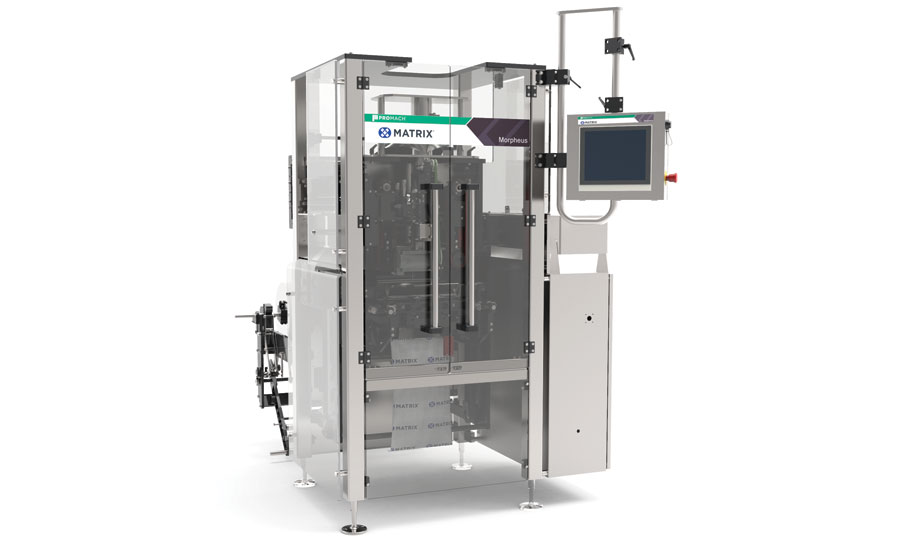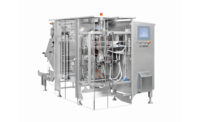Consumer trends are driving bakery/snack production in the areas that form/fill/seal (FFS) systems accommodate. The types of packaging formats being requested by retailers and consumers is a major factor. As a result, the latest FFS systems can produce single-serve, portion-controlled packs at high speeds while offering quick changeover.
Delivering to the trends
Busy lifestyles, in addition to the growth of single-person households, have driven demand for single-portion packages. This has prompted bakery/snack producers to add and modify existing FFS lines to produce single-serve containers.
Consumers are looking for individual serving-sized bags that they can take on-the-go. This is even truer during the 2020 pandemic, as consumers look for healthy snacks that may boost immunity, such as nuts, seeds and dried fruit, according to Kim Magon-Haller, marketing manager, Triangle Package Machinery Co., Chicago. “These products are often packaged in small pouches, tube bags or stand-up pouches with zippers. Manufacturers of trail mixes and related products want bagging systems that can run those bag styles at high speeds.”
Brands are looking to distinguish themselves on retail shelves, and they can do that through innovative package style, design and functionality. “Single-serve options are popular, so it’s critical to be able use display options such as hanging products on pegs or hooks. Easy access to products on store shelves is critical,” says Christine Duncan, marketing manager, flexibles, Matrix Packaging Machinery, a ProMach brand, Saukville, WI.
Angela McDaniel, marketing coordinator, Formost Fuji Corp., Woodinville, WA, agrees that single-serve packages are in high demand, if not more so, amid COVID-19 concerns. “Last year at this time, we were focused on recyclable and sustainable packaging; although that is still an important goal, consumers are looking for safety first and want to see that packages are sealed and protected.”
During the 2020 pandemic, some FFS vendors have seen the trend to small pack styles switch to large family-size bags, according to Jason D’Arcy, product manager at Kliklok LLC, a Syntegon company, Decatur, GA. “This demand was prompted not just because people are staying home, but because they want to save through bulk buying. So bakery/snack producers are requesting machine options that offer quick changeover for different pack styles and sizes.”
Equipment developments
New FFS systems accommodate a wide range of packaging options at high speeds, and provide packaging formats that bring convenience to shoppers. Features such as recloseability and easy-open options are attractive to brand owners and consumers. “To meet this need, our vertical FFS systems include Inno-Lok front panel, Inno-Lok bag top and EZ-Stand recloseable packaging formats,” says Joe Vannieuwenhoven, sales executive, Parsons-Eagle Packaging Systems, De Pere, WI.
In the area of horizontal flow wrapping, product sizes are getting smaller and speeds are getting higher, according to Kelly Meer, product manager at Syntegon Packaging Technology LLC, New Richmond, WI. “Individually wrapped products are more common, such as snack packs or multi-packs. Often, we will have smaller snacks flow wrapped and then moved to a vertical machine where the products are packaged in a larger, re-sealable bag.”
Mike McCann, packaging specialist, Reiser, Canton, MA, says that many high-output applications can take advantage of FFS machines’ versatile tooling setups, die designs and changeover simplicity to run multiple products on a single line. “Tooling changeovers from one package size to another are fast and easy. We’ve come up with creative and inexpensive ways to create group and/or bulk packs as well as singles on one machine.”
A recent development in this sector is the ability to create packages that perform like a stand-up pouch with slightly modified vertical FFS machinery, through a change in gusset application, according to Sean Riley, senior director, media and communications, PMMI, Reston, VA. “This provides the benefits of stand-up pouches (high product visibility, efficient stocking, improved top-shelf presence, additional product facings per shelf) with less investment than is required for conventional stand-up pouches.”
Sanitary design of FFS equipment has improved to accommodate food safety regulations. In fact, vendors across the board now offer comprehensive sanitation features.
Roger Stainton, president, Effytec USA LLC, De Pere, WI, says today’s machines are being built to very high sanitary standards. “Electronics can be outsourced up to IP 67 or IP 69 K washdown specification levels, stainless steel materials and stand-off designs can be applied, and open-frame designs can be utilized. Mechanical cabinets can be pressurized with air to prevent dust from entering, or supplied as NEMA 4X to prevent liquid or dust from entering. Also, cooling systems can be installed inside cabinets if needed.”
Among FFS equipment recently introduced to the snack and bakery market, Effytec USA, LLC has unveiled the Model GP 26 STU SZ machine. Its design is focused on co-packing, which requires pouch-size capabilities ranging from 5 x 6 to 10.25 x 13.75-inches; flexibility and versatility (stand-up, flat, zipper); quick format changeover (15-30 minutes) and high output (75 ppm). “We focused the machine on being almost exclusively servo-drive so that many settings and positions can be saved to a recipe; as a result, changeovers can be achieved at the push of a button. Also, any mechanical parts that need changing feature tool-less quick-release design,” Stainton says.
Formost Fuji Corp. has introduced the FW3400CX II Horizontal Flow Wrapper. Available in rotary or box motion, and standard or inverted design, the machine wraps a variety of product sizes and types with options for high speed, long dwell time and automation. “By utilizing induction fin seal heaters, the machine saves energy via faster temperature response and higher accuracy. Simple removal of the discharge conveyor provides easy access for cleaning,” McDaniel says. Human-machine interface facilitates operator interaction with the machine.
Matrix Packaging Machinery, a ProMach brand, has introduced the Morpheus vertical FFS machine. It uses a continuous-motion, high-speed jaw system, which cuts film and provides just enough dwell time for three pouch seams to seal properly, all while film is in motion. This allows the machine to run films that require a higher dwell time, such as polyethylene, at cycle speeds of up to 200 bags per minute.
Triangle Package Machinery Co. offers the Compact Sanitary Bagger vertical FFS machine, which is ideal for tight spaces. With only a 36-inch footprint, it can run bags ranging from 2.5 to 13 inches wide and up to 15 inches long. It allows users to pair two baggers side-by-side with a single scale. The company also offers the Model XYRJ vertical FFS machine, which can run multiple bag styles, such as pillow bags, 3-sided seal bags, gusseted bags and stand-up pouches with an optional zipper.
Parsons-Eagle Packaging Systems offers a line of vertical FFS equipment, which can process many bag types for a variety of film structures. The company recently introduced a servo-driven bagging line that fills pre-made laminated paper bags with bakery goods at speeds up to 80 cycles per minute. A combination scale and dual-lane bagger is integrated with downstream sealing and Tin-Tie applicators to package a variety of bakery/snack products including donuts, cookies, salty snacks and tortilla chips.
Paxiom Group Inc., Las Vegas, offers the XPdius 1700 vertical FFS machine. Capable of filling bags up to 17 inches wide and 24 inches long, the machine can be integrated with a multi-head weigher to weigh, fill and bag snack food. Both sides open, which gives maintenance people easy access, and features include tool-less removal of change parts. The company also offers the DoyPax vertical FFS machine, which produces standup pouches at 55 bags per minute.
During the past year, Syntegon has been making modifications to existing FFS machines to run more sustainable films. “This helps our customers become more eco-conscious and gives them a wider range of film options,” D’Arcy says.
Campbell Wrapper Corp., De Pere, WI, offers a Moving Junction Non-Contact Feeder for its horizontal flow wrappers, which is ideal for fragile bakery products. A cantilevered frame provides easy access for sanitation and maintenance. In fact, one operator can disassemble and reassemble the feeder in 20 minutes. Seamless integration with the company’s horizontal flow wrappers offers a single operator control point via touchscreen.
Looking ahead, FFS machinery and labeling, decorating and coding machinery types are forecast to grow more quickly than all categories until 2025, at compound annual growth rates of 1.4 percent and 1.1 percent, respectively, according to PMMI’s 2020 State of the Industry Report. “Closing machinery shipments are forecast for low growth relative to the packaging machinery market as a whole. A notable factor influencing this is the ongoing replacement of closing equipment by FFS machinery,” Riley says.



